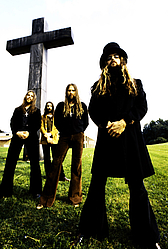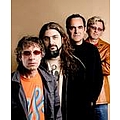Bigelf is a psychedelic/progressive rock band from Los Angeles, CA, United States who released their debut album in 1996. Their sound is a combination of Black Sabbath, Pink Floyd and The Beatles. The band consists of Damon Fox on lead vocals, keyboards, Ace Mark on guitars, Duffy Snowhill on bass and Froth on drums. -BIO- There’s nothing ordinary about the fabled Los Angeles quartet Bigelf. In fact, even the extraordinary are crushed in the wake of a heroic bombast so brilliant, you can’t help but be swept adrift by the doomed mist of infectious melodies and chilling harmonies that collide with an otherworldly embrace of the psychedelic on “Cheat the Gallows,” the band’s debut release for Linda Perry’s Custard Records. The epic album is the soundtrack for new world disorder. We’re talking about a pop-cultural phenomenon shaped by the muse of Black Sabbath, Pink Floyd, Queen and The Beatles. Bigelf are massive in stature, muscular in tone and beautifully diabolic, oozing with the credibility of artistic savant and ironclad integrity. “Our genetic codes are from the great ones, the great acts and rock groups of the past,” says frontman Damon Fox. “We’ve been exploring taboo grounds for a long time, and the oxygen is really thin up here. It’s a very high mentality, and there’s very little room for error. When you get into those psychedelic and progressive rock categories, you’re battling some of the greatest shit that ever existed, so you’re either going to be great, or you’re going to suck.” Fox loves sprinkling conversations about his band’s music with the word “progressive,” but let’s make something perfectly clear: Bigelf don’t create music, they craft orchestrations. And Bigelf aren’t progressive like a bunch of guitar school students trying to outplay each other and see who can set their strings on fire first, they’re progressive in the sense that they truly take hard rock into the future, embracing the genre’s rich cultural past and reinterpreting it with a slant and skew that gives the new millennium a sound it’s been waiting far too long for: “Strawberry Fields” tossed with the acid-wash of mushroom caps, “The Wizard” taken to whole new heights of paranoia, “Dream Police” with souped-up squad cars, and a more divine “Karn Evil No. 9.” “The creativity of psychedelic rock and the limitless horizons of prog rock are totally gone today. There are too many formulas, too many rules, and everybody is just too bogged down with singles, sales, and their MySpace pages… We still care about pressing boundaries,” says the frontman. From the hyperkinetic zeitgeist and manic sideshow glee of opening colossus “Gravest Show on Earth,” to the cinematic sound explosion of closing track “Counting Sheep,” the run-of-the-mill gets run through the mill on “Cheat the Gallows,” as Fox, guitarist Ace Mark, bassist Duffy Snowhill and drummer Froth dare modern rock and roll to try and keep pace. They pillage the tired and thought-to-be-true with a brazenly aggressive approach to guitar driven histrionics, haughty Hammond organ and majestic Mellotron tapestries, and a bottom end that spins, swirls and a surrounds the senses with penetrating bass lines and an upright backbone of drums that pave the defiant pace. At the forefront of the musical melee is lead single “Money It’s Pure Evil,” a master class in marrying blues-based, classic rock tendencies with today’s more mainstream fancies for minimalist rock and roll missives. “I wrote that song when I was 21 years-old, and it’s straight from the John Lennon playbook,” says Fox, who admits that the song has fragmented over the course of the past decade-plus, but still rings truer than ever. “The video is fantastic and inspiring, about Hollywood and the darkness of fame and what happens to people caught in its web. The train’s off the track, but people are too busy looking at it to do anything about it…” Not Bigelf, who do plenty of eye (and ear) opening throughout the course of their defining 60-minute opus. “If you think back, Guns N’ Roses were the last dangerous band truly living the lifestyle, destroying hotel rooms and pushing the envelope,” Fox recalls. “That era may be over, but music should still be dangerous. We’re more into the heady, intellectual side of danger, and the envelopes we’re pushing are in your mind. We’re pushing thoughts and emotions, not news clippings of someone getting arrested.” “Gravest Show on Earth” is the quintessential opening track, a twisted joyride of marching drums, sinister vocals that will make Robin Zander squirm with pride, and a sonic smorgasbord of Sgt. Pepper-worthy salutations that beckon you in with a long, twisted finger and set the tone for the album’s ensuing cuts. “Blackball” is a heavy, down-tuned swash of melodic rapture saturated in a lyrical escape from the corporate stranglehold, while “The Evils of Rock and Roll” features the band’s signature maniacal vocals atop a Tony Iommi-inspired guitar assault. Throughout, Bigelf embrace their unwavering affinity for not only honing a pop aesthetic, but honoring it throughout the song. “No Parachute” and “Race with Time” shift into demented shades of Pink Floyd-fashioned hypnotic psychosis, “Superstar” submits to the saucy seduction of a rock and roll sellout, and “Hydra” is a frenzied rush of steel-toed swagger that drips with chaotic power and is drenched in hallucinatory Bigelf dynamics. One of Fox’s favorite reviews of his band hailed that Bigelf are “30 years behind and five years ahead of what’s happening.” It’s a line the frontman is proud of, and loves to repeat. “The concept behind Bigelf has been to take strong, classic melodies and dark, neurotic songwriting, and synthesize them with demonic guitar riffs and analog keyboard wizardry. There were few bands that did both, so there wasn’t a template or blueprint to follow… The Beatles and Black Sabbath, at the same time, is what has always come natural to us, and that has always been the genesis of it all.” With the release of their “Closer to Doom” EP in 1995, Bigelf established themselves as founding fathers of the psychedelic doom movement that spawned the Los Angeles stoner-rock scene. In the 13 years since, they’ve released two full-length albums and attained cult phenomenon status overseas, most notably in Europe and the Scandinavian homeland of Ace Mark and Duffy Snowhill. Both those albums were met by major-label recording contracts that promised worldwide success, but instead resulted in the corporate backwash that has defined the modern music industry.




















